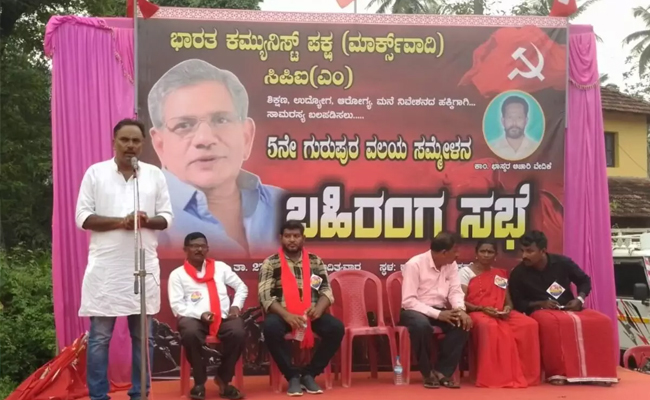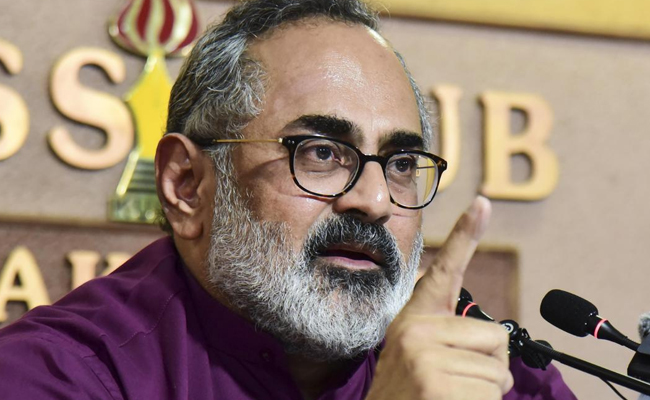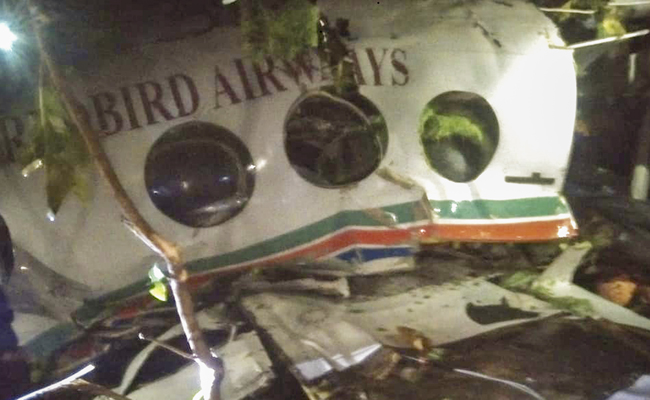Mangalore: CPIM state committee member Muneer Katipalla stated that the Congress party had surrendered to communalism in the Dakshina Kannada district and had formed an unholy alliance with the BJP and Sangh Parivar leadership. He was addressing an open meeting organized at Kuppepadavu on the occasion of CPIM Gurupura Zonal Conference on Monday.
"The BJP MLAs of the district, who took advantage of the political polarization and hate politics engineered by the Sangh Parivar, and won an easy victory, are not raising their voices on the burning issues of Tulunadu. Even minimal issues like road repair, filling of poltholes and under construction highway do not bother them. Major issues like employment for locals, establishment of government hospitals, medical colleges, fisheries and housing projects do not appear in their priority list”, he said.
Referring to the Mangalore North Constituency, Muneer Katipalla said that it was troubled by many serious issues but MLA Bharat Shetty was not ready to listen to people's problems as he had limited himself to giving statements filled with communal hatred. "Organizing a 'food fair' before the incomplete skeleton-like Surathkal Market building which stands beside the pot hole filled Surathkal highway stands proof for the brazenness of the BJP MLAs. The leaders of the ruling Congress party should have raised their voice against the incompetence of the BJP MLAs and stood with the people who are at the receiving end of this. However, the Congress party in the district has surrendered to communalism. It has forged an unholy alliance with BJP and the Sangh Parivar leadership. Congress leaders have appeared together with BJP leaders during huli kunita (tiger dance) and Puttur VHP program without any embarrassment. They have stood against the interests of the common people", he added.
Muneer Kantipalla alleged that the bonding of these supposed political rivals had reached such heights that it was difficult to differentiate between BJP and Congress in DK. “This unethical alliance of Congress and BJP has made the interests of the ruling and business classes here unquestionable. While this has brought about a situation where providing solutions to the common man's problems has become impossible, CPIM party has taken this as a challenge and it will fight for the people. If Congress doesn't rectify its mistakes, it will pay a heavy price for this", he warned.
Before the open meeting, CPIM workers took out a procession from Narayana Guru Community Centre, where the delegate session of the conference was held, to the Kuppepadavu town.
Rajesh Naik Iruvail presided over the meeting. District Secretary Dr. Krishnappa Konchadi, Zonal Secretary Sadashiva Das, Vasanthi Kuppepadavu, N A Hasanabba and others were present.
Let the Truth be known. If you read VB and like VB, please be a VB Supporter and Help us deliver the Truth to one and all.
Judge cites denial of home to Muslim girl, opposition to Dalit women cooking mid-day meals
Hyderabad, February 23, 2026: Supreme Court judge Justice Ujjal Bhuyan has said that despite repeated affirmations of constitutional morality by courts, deep societal faultlines rooted in caste and religious discrimination continue to shape everyday realities in India.
Speaking at a seminar on “Constitutional Morality and the Role of District Judiciary” organised by the Telangana Judges Association and the Telangana State Judicial Academy in Hyderabad, Justice Bhuyan reflected on the gap between constitutional ideals and social practices.
He cited a recent instance involving his daughter’s friend, a PhD scholar at a private university in Noida, who was denied accommodation in South Delhi after her surname revealed her Muslim identity. According to Justice Bhuyan, the landlady bluntly informed her that no accommodation was available once her religious background became known.
In another example from Odisha, he referred to resistance by some parents to the government’s mid-day meal programme because the food was prepared by Dalit women employed as cooks. He noted that some parents had objected aggressively and refused to allow their children to consume meals cooked by members of the Scheduled Caste community.
Describing these incidents as “the tip of the iceberg,” Justice Bhuyan said they reveal how far society remains from the benchmark of constitutional morality even 75 years into the Republic. He observed that while the Constitution lays down standards of equality and dignity, the morality practised within homes and communities often diverges sharply from those values.
He emphasised that constitutional morality requires governance through the rule of law rather than the rule of popular opinion. Referring to the evolution of the doctrine through judicial decisions, he cited Naz Foundation v Union of India, in which the Delhi High Court read down Section 377 of the Indian Penal Code, holding that popular morality cannot restrict fundamental rights under Article 21. Though the judgment was later overturned in Suresh Kumar Koushal v Naz Foundation, the Supreme Court ultimately restored and expanded the principle in Navtej Singh Johar v Union of India, affirming that constitutional morality must prevail over majoritarian views.
“In our constitutional scheme, it is the constitutionality of the issue before the court that is relevant, not the dominant or popular view,” he said.
Justice Bhuyan also addressed the functioning of the district judiciary, underlining that trial courts are the first point of contact for most litigants and form the foundation of the justice delivery system. He stressed that due importance must be given to the recording of evidence and adjudication of bail matters.
Highlighting the role of High Courts, he said their supervisory jurisdiction under Article 227 of the Constitution is intended as a shield to correct grave jurisdictional errors, not as a mechanism to substitute the discretion or factual appreciation of trial judges.
He recalled that several distinguished judges, including Justice H R Khanna, Justice A M Ahmadi, and Justice Fathima Beevi, began their careers in the district judiciary.
On representation within the judicial system, Justice Bhuyan noted that Telangana has made significant strides in gender inclusion. Out of a sanctioned strength of 655 judicial officers in the Telangana Judicial Service, 478 are currently serving, of whom 283 are women, exceeding 50 per cent representation. He added that members of Scheduled Castes, Scheduled Tribes, minority communities, and persons with disabilities are also represented in the state’s judiciary.
He observed that greater representation of women, marginalised communities, persons with disabilities, and sexual minorities would help make the judiciary more inclusive and reflective of India’s diversity. “The judiciary must represent all the colours of the rainbow and become a rainbow institution,” he said.
Justice Bhuyan also referred to the recent restoration by the Supreme Court of the requirement of a minimum three years of practice at the Bar for entry-level judicial posts. While acknowledging that the requirement ensures practical exposure, he cautioned that its impact on women aspirants, especially those from rural or small-town backgrounds facing social and financial constraints, would need to be carefully observed over time.
Concluding his address, he reiterated that the justice system must strive to bridge the gap between constitutional ideals and lived realities, ensuring that the rule of law remains paramount.




